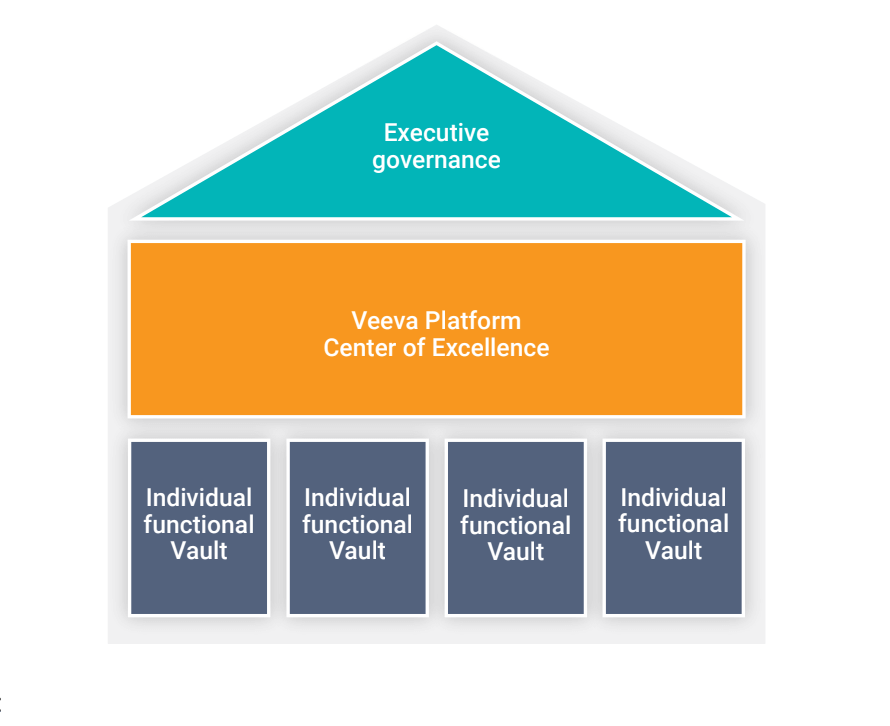As biopharma organizations adopt multiple Vault applications across business teams, it’s important to
consider connectivity and coordination to realize the full value of the Vault Platform. In response, companies
are introducing Veeva Centers of Excellence (CoE) to provide historically siloed Vault product teams with a
foundation for strategic cross-pollination. While all Veeva CoEs have common operating principles and goals,
each is tailored to an organization’s needs and maturity level.
With Veeva CoEs in place, biopharmas can seamlessly bridge the gap between vision and execution, encouraging
cross-Vault alignment in platform design, change management, and technical connectivity. There are several
ways in which a CoE can drive value for your organization:
- Strategic alignment and best practices:
The CoE serves as a central hub for best
practices, providing Vault teams with
strategic guidance in industry trends,
regulatory compliance, and innovative
approaches, which positions them as
leaders in the field. - Optimized operational efficiency:
The CoE streamlines processes, ensuring
consistent and coordinated management
for all Vault applications. - Enhanced data management and
connectivity: By centralizing data
management within a CoE, organizations
can enhance their connectivity across
business teams while also developing
reliable metrics for reporting. - Accelerated implementation and adoption:
With cross-Vault knowledge and resource sharing, a CoE can expedite the implementation of Veeva solutions
and facilitate rapid adoption across the organization. - Comprehensive training and support: CoEs can provide dedicated training resources, repeatable processes,
and ongoing support for Vault teams as new features are released three times per year. - Cost-efficient resource utilization: By pooling expertise and resources, CoEs optimize costs, efficiently
allocate resources, and avoid redundancies for Vault management.

How It Works
Designing a CoE necessitates careful planning to ensure that the new structure fits both individual and team
needs, and that the organization is prepared for the change. Veeva recommends the following steps to assess
which Vaults are involved, outline the goals for future Vault initiatives, and identify which key capabilities
are needed.
- What is required of the CoE?
Align on which Vaults are in scope and host a series of discussions to understand Vault-
level governance challenges, data and architecture considerations, relevant L2 business
process areas, impacted stakeholders, governance objectives, business impacts, and
potential links to other Vault-level areas (e.g. Veeva Connections). Develop a list of desired
CoE capabilities and prioritize them according to relevant timing, magnitude of impact,
and complexity. - How will the CoE manage cross-Vault activities?
For each confirmed capability, define your objectives, current and future state, inputs and
outputs, and required resources. Document who will be responsible for delivery, estimate
the value of the impact of the CoE, and where possible, align on a specific resourcing model
to fulfill the CoE service objectives. - Who will be involved? When will they meet? Where will these activities
take place?
Develop a recommended CoE working model with key personnel, meeting and reporting
frequency, escalation criteria, and a RACI matrix. Socialize the model and gather feedback
from key stakeholders to inform a roadmap for expanding CoE capabilities and overall
scope to future Vaults. Host a meeting to discuss your final CoE model and the associated
framework, interim period activities, and additional elements that will feed into the
steady-state.
While organizations can build and sustain their own CoEs, Veeva’s Business Consulting team is well-equipped
to support these efforts and offer best practices.
To learn more, reach out to businessconsulting@veeva.com.
